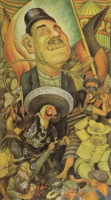Dictatorship
Definitions
- 1: the office of dictator
- 2: autocratic rule, control, or leadership
- 3a : a form of government in which absolute power is concentrated in a dictator or a small clique
- b : a government organization or group in which absolute power is so concentrated
- c : a despotic state
Description
A dictatorship is defined as an autocratic form of government in which the government is ruled by an individual, the dictator. It has three possible meanings:
- 1. A Roman dictator was the incumbent of a political office of the Roman Republic. Roman dictators were allocated absolute power during times of emergency. Their power was originally neither arbitrary nor unaccountable, being subject to law and requiring retrospective justification. There were no such dictatorships after the beginning of the 2nd century BC, and later dictators such as Sulla and the Roman Emperors exercised power much more personally and arbitrarily.
- 2. A government controlled by one person, or a small group of people. In this form of government the power rests entirely on the person or group of people, and can be obtained by force or by inheritance. The dictator(s) may also take away much of its peoples' freedom.
- 3. In contemporary usage, dictatorship refers to an autocratic form of absolute rule by leadership unrestricted by law, constitutions, or other social and political factors within the state.
In the 20th century and early 21st century hereditary dictatorship remained a relatively common phenomenon.
For some scholars, a dictatorship is a form of government that has the power to govern without consent of those being governed (similar to authoritarianism), while totalitarianism describes a state that regulates nearly every aspect of public and private behavior of the people. In other words, dictatorship concerns the source of the governing power (where the power comes from) and totalitarianism concerns the scope of the governing power (what is the government).
In this sense, dictatorship (government without people's consent) is a contrast to democracy (government whose power comes from people) and totalitarianism (government controls every aspect of people's life) opposes pluralism (government allows multiple lifestyles and opinions).
Other scholars stress the omnipotence of the State (with its consequent suspension of rights) as the key element of a dictatorship and argue that such concentration of power can be legitimate or not depending on the circumstances, objectives and methods employed.[1]
